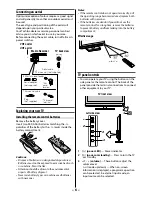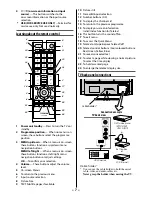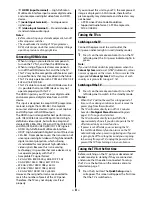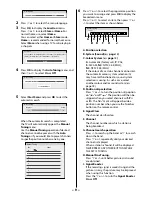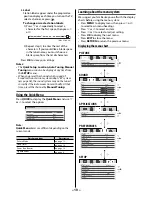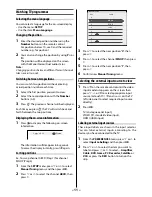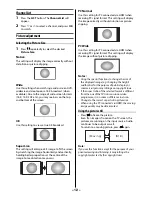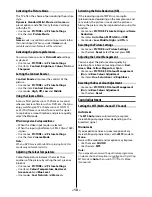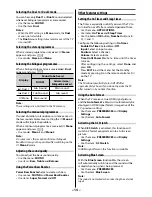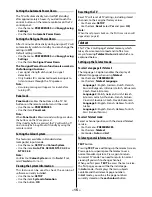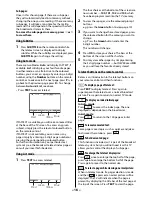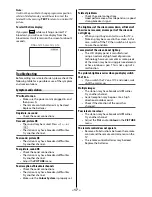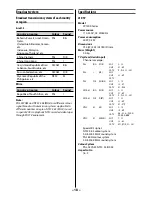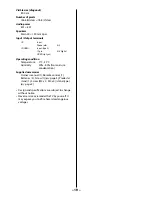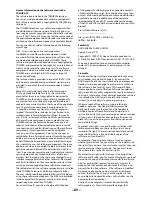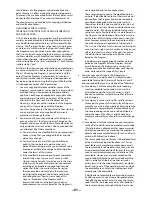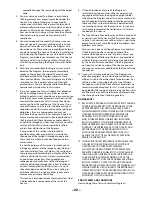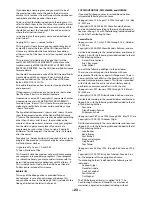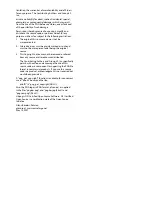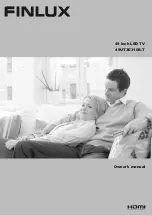
– 20 –
License Information on the software used in the
TOSHIBA TV
The software pre-installed in the TOSHIBA Televisions
consists of multiple, independent software components.
Each software component is copyrighted by TOSHIBA or a
third party.
The TOSHIBA Televisions uses software components that
are distributed as freeware under a third-party end-user
license agreement or copyright notice (hereinafter referred
to as a "EULA"). Some EULAs require that the source code of
the applicable component be disclosed as the condition for
distributing the software component in executable format.
You can check EULA related information on the following
Home Page:
URL : http://www.regza-asia.com/support/oss
In addition, some of the software components which
are used in Toshiba Televisions include the software that
are made or developed originally by TOSHIBA. These
software and accompanied documents are copyrighted by
TOSHIBA, and protected by Copyright Act, an international
treaty's articles and other governing laws. The software
components which are made or developed originally by
TOSHIBA and not subject to EULAs are not a target of
source code off ering.
The Toshiba warranty provided in respect of the TV is the
only warranty provided and no additional warranties are
provided in respect of the software components subject
to EULAs.
Some of the software components distributed under
EULAs are made available for use by the user on the
premise that they are not copyrighted or warranted by
TOSHIBA or any third party. These software components
are licensed to the user free of charge and therefore not
covered by any warranty within the scope of the applicable
laws. These software components are provided in "as
is" condition without any warranty, whether express or
implied. "Warranty" here includes, but not limited to, an
implied warranty for marketability or fi tness for specifi c
uses. All risks associated with the quality or performance
of these software components are assumed by the user.
TOSHIBA shall not be liable whatsoever for any cost of
repair or correction or other incidental expense incurred
in connection with a defect found in any of these software
components. Unless specifi ed under the applicable
laws or in a written agreement, a party who changes or
redistributes the software with consent from the copyright
holders or based on the aforementioned licenses shall not
be held liable whatsoever for any loss arising from the use
of or inability to use such software components. The same
applies even when the copyright holders or relevant third
parties have been informed of the possibility of such loss.
"Loss" here includes normal, special, incidental and indirect
loss (including, but not limited to, the loss of data or its
accuracy; loss incurred by the user or any third party; and
interface incompatibility with other software). Please read
each EULA for details on the use conditions and items that
must be observed regarding these software components.
The table below lists the software components pre-installed
in the TOSHIBA Televisions, which are subject to EULAs.
The user should read the applicable EULAs carefully before
using these software components. The EULAs are exhibited
in their original text (English) as exactly written by the
respective parties other than TOSHIBA.
For at least three (3) years from the date of distribution
of this product, Toshiba will give to anyone who contacts
<[email protected]>, for a charge of no more than
our cost of physically performing source code distribution,
a complete machine-readable copy of the complete
corresponding GPL and LGPL source code for the version
of the GPL and LGPL code that we distributed to you in this
product.
Pre-Installed Software - EULA
--------------------------------------
File system(FAT32,NTFS) - Exhibit (A)
libPNG – Exhibit(B)
Exhibit (A)
GNU GENERAL PUBLIC LICENSE
Version 2, June 1991
Copyright (C) 1989, 1991 Free Software Foundation, Inc.,
51 Franklin Street, Fifth Floor, Boston, MA 02110-1301 USA
Everyone is permitted to copy and distribute verbatim
copies of this license document, but changing it is not
allowed.
Preamble
The licenses for most software are designed to take away
your freedom to share and change it. By contrast, the
GNU General Public License is intended to guarantee your
freedom to share and change free software--to make sure
the software is free for all its users. This General Public
License applies to most of the Free Software Foundation's
software and to any other program whose authors commit
to using it. (Some other Free Software Foundation software
is covered by the GNU Lesser General Public License
instead.) You can apply it to your programs, too.
When we speak of free software, we are referring to
freedom, not price. Our General Public Licenses are
designed to make sure that you have the freedom to
distribute copies of free software (and charge for this
service if you wish), that you receive source code or can get
it if you want it, that you can change the software or use
pieces of it in new free programs; and that you know you
can do these things.
To protect your rights, we need to make restrictions that
forbid anyone to deny you these rights or to ask you to
surrender the rights. These restrictions translate to certain
responsibilities for you if you distribute copies of the
software, or if you modify it.
For example, if you distribute copies of such a program,
whether gratis or for a fee, you must give the recipients all
the rights that you have. You must make sure that they, too,
receive or can get the source code. And you must show
them these terms so they know their rights.
We protect your rights with two steps: (1) copyright the
software, and (2) off er you this license which gives you legal
permission to copy, distribute and/or modify the software.
Also, for each author's protection and ours, we want to
make certain that everyone understands that there is no
warranty for this free software. If the software is modifi ed
by someone else and passed on, we want its recipients
to know that what they have is not the original, so that
any problems introduced by others will not refl ect on the
original authors' reputations.
Finally, any free program is threatened constantly by
software patents. We wish to avoid the danger that

